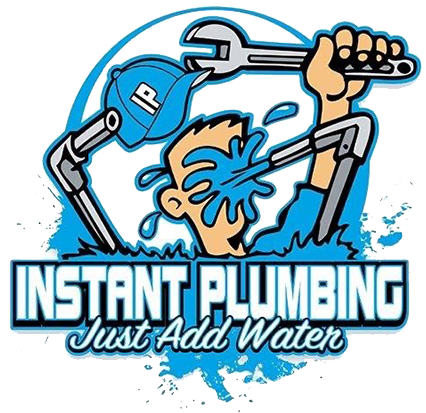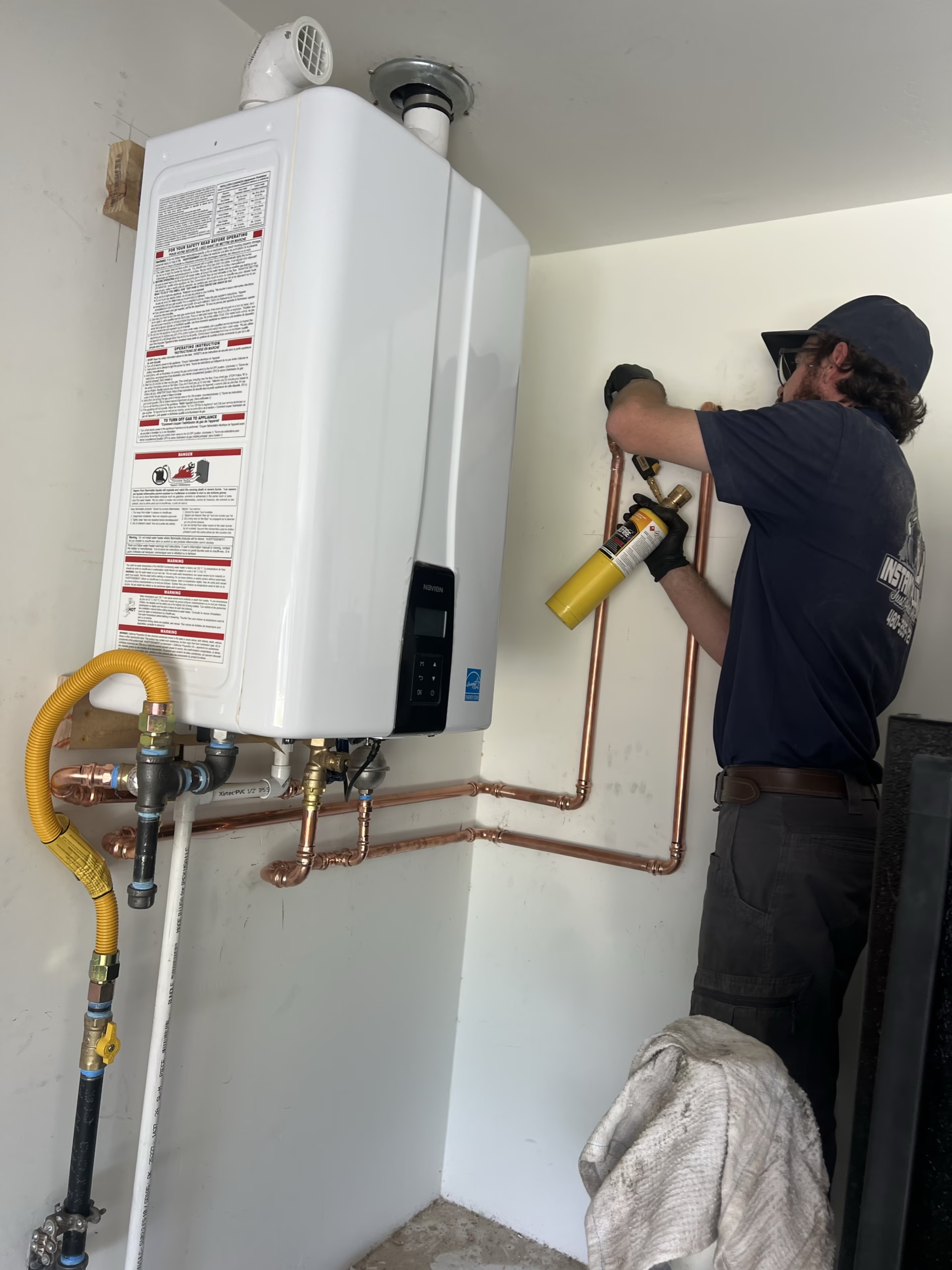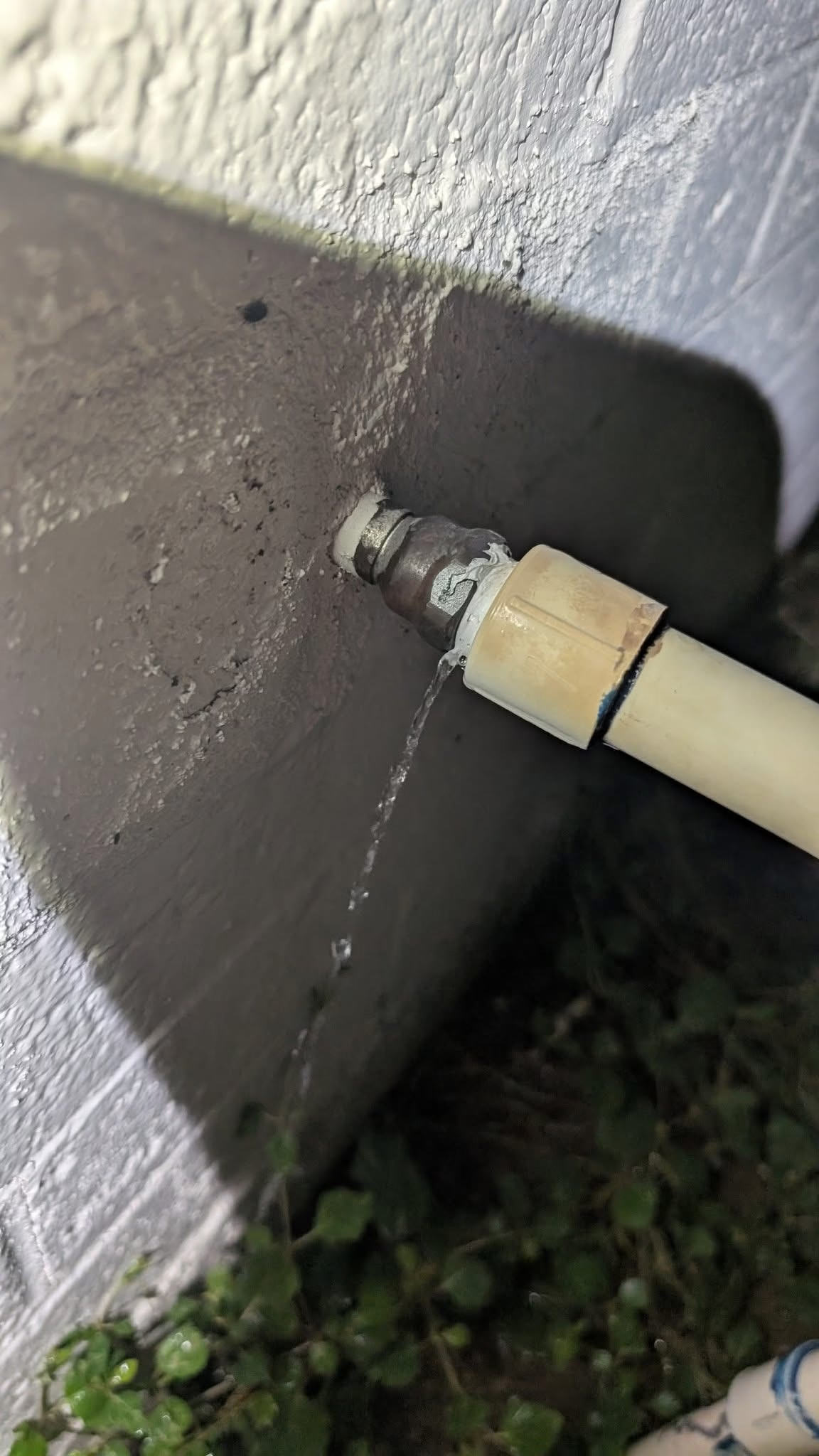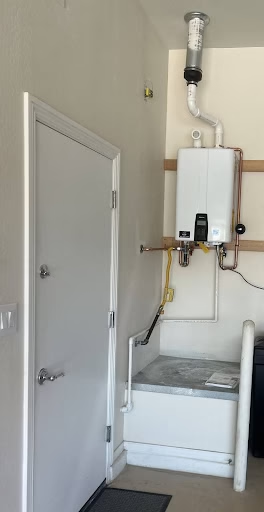You know that feeling? You step out of the shower, and your skin feels tight and itchy, not smooth and refreshed. You wash a load of dishes, and they come out with those annoying spots. You scrub your sinks and showers, but that white, chalky buildup just keeps coming back. If you live in Phoenix, Glendale, Scottsdale, or anywhere else in the Valley, you’re likely dealing with hard water.
We get it. Here at Instant Plumbing, serving homeowners across the Phoenix metro area since 2001, we hear about these frustrations all the time. It’s not just annoying; it can feel like you’re constantly fighting a losing battle against your own water. You might even be wondering if there’s something wrong with your plumbing or if you’re using the wrong soaps. The truth is, the problem is usually the water itself. But don’t worry, we’re here to explain what’s going on and how to fix it!
Understanding Hard Water in Phoenix: What You Need to Know
What Exactly is Hard Water?
Simply put, hard water is water that has a high mineral content, specifically calcium and magnesium. These minerals aren’t harmful to drink, but they can cause a lot of problems around your house. Think of it like this: regular water is like a clean sponge, while hard water is like a sponge filled with tiny bits of rock.
Why Phoenix Water is Naturally Hard
The Phoenix area gets its water from a few different sources: the Colorado River, local rivers, and groundwater. All of these sources pick up minerals as the water travels through the earth. The geology of our region, with its abundance of limestone and other mineral-rich rocks, means our water is naturally on the harder side. It’s just the nature of the beast here in the desert!
How to Identify Hard Water in Your Home
You don’t need a science lab to figure out if you have hard water. Here are some common clues:
- Soap Scum: This is that white, filmy residue that builds up on your shower walls, shower doors, sinks and faucets. It’s hard water reacting with soap.
- Spotty Dishes: If your glasses and dishes come out of the dishwasher with spots, even after using a rinse aid, it’s a classic sign of hard water.
- Dry Skin and Hair: Hard water can strip away natural oils, leaving your skin feeling dry and itchy and your hair dull and lifeless.
- Reduced Water Pressure: Over time, mineral buildup can clog your pipes, reducing water flow from your faucets and showerheads.
- Appliance Problems: Hard water can damage water-using appliances like water heaters, dishwashers and washing machines, shortening their lifespan.
The Unseen Problems Hard Water Creates in Your Home
Impact on Your Plumbing and Appliances
Hard water isn’t just a surface-level annoyance; it can actually wreak havoc on your plumbing system and appliances.
Clogged Pipes and Reduced Water Flow
Those calcium and magnesium minerals we talked about? They don’t just disappear. They stick to the inside of your pipes, gradually building up a layer of scale. This buildup can narrow the pipes, reducing water flow and pressure. It’s like your plumbing is getting clogged arteries!
Damage to Water-Using Appliances
Water heaters, dishwashers, washing machines – anything that uses water is vulnerable to hard water damage. The mineral buildup can cause these appliances to work harder, use more energy and ultimately break down sooner.
Shortened Lifespan of Water Heaters
Water heaters are particularly susceptible. The minerals can create a thick layer of insulation on the heating element, making it less efficient and causing it to overheat. This can lead to premature failure of your water heater, a costly and inconvenient problem.
Effects on Your Cleaning and Personal Care
Hard water makes everyday cleaning and personal care routines much less effective and more frustrating.
Soap Scum and Residue Buildup
We’ve all seen it: that stubborn soap scum that clings to everything in your bathroom. It’s not just ugly; it’s also hard to clean! Hard water prevents soap from lathering properly, leaving behind a sticky residue instead of a clean surface.
Ineffective Cleaning with Soap and Detergent
Hard water reduces the effectiveness of soaps, detergents and cleaning products. You have to use more product to get the same level of clean, which means you’re spending more money and potentially exposing yourself to more chemicals.
Dry Skin, Dull Hair and Other Personal Care Problems
Hard water can be harsh on your skin and hair. It can strip away natural oils, leading to dryness, itchiness, and irritation. Hair can become dull, brittle, and difficult to manage. It’s like your water is fighting against you!
Household Surfaces and Fixtures at Risk
Hard water leaves its mark on more than just your skin and appliances. It can also damage and discolor your household surfaces.
Unsightly Spots on Dishes and Glassware
Those spots on your dishes and glasses aren’t just a cosmetic issue. They’re mineral deposits that are difficult to remove and can make your dishes look dirty even when they’re clean.
Mineral Stains on Sinks, Showers and Toilets
Hard water stains can be incredibly stubborn. They can leave unsightly white or yellowish deposits on your sinks, showers and toilets, making them look old and dirty even after you’ve scrubbed them.
Corrosion and Damage to Faucets and Showerheads
Over time, hard water can corrode metal fixtures like faucets and showerheads. The mineral buildup can also clog these fixtures, reducing water flow and causing them to not work properly.







Common Myths and Misconceptions About Hard Water
There are a lot of misunderstandings about hard water. Let’s clear up some of the most common myths.
“Hard Water Isn’t Really a Problem”
This is simply not true. While hard water isn’t dangerous to drink, it causes a wide range of problems in your home, from damaging your plumbing to making cleaning and personal care more difficult. Ignoring hard water problems can lead to costly repairs and unnecessary frustration.
“Drinking Hard Water is Bad for You”
This is a myth. The minerals in hard water, calcium and magnesium, are actually essential nutrients. Drinking hard water is generally considered safe and may even have some health benefits. The problems with hard water are mostly related to its effects on your plumbing and appliances.
“All Water Softeners Are the Same”
There are different types of water softeners, and they don’t all work the same way. Salt-based water softeners are the most common and effective, but there are also salt-free water conditioners and other alternatives. It’s important to choose the right solution for your specific needs.
Effective Solutions for Phoenix Hard Water Problems
Fortunately, there are several ways to combat hard water and its effects.
Water Softeners: The Most Common Solution
Water softeners are the most effective way to remove the minerals that cause hard water problems.
How Salt-Based Water Softeners Work
Salt-based water softeners use a process called ion exchange. They replace the calcium and magnesium ions in hard water with sodium or potassium ions, effectively “softening” the water.
Understanding Different Types of Water Softeners
There are different sizes and types of water softeners, designed for different household needs. Some are whole-house systems, treating all the water that enters your home, while others are point-of-use systems, treating water only at specific locations like your shower or kitchen sink.
Benefits of Installing a Water Softener
The benefits of a water softener are numerous:
- Softer skin and hair
- Cleaner dishes and glassware
- Less soap scum and mineral buildup
- Extended lifespan of appliances
- Improved water flow and pressure
- Reduced energy costs
Alternative Water Treatment Options
While water softeners are the most common solution, there are other options to consider.
Salt-Free Water Conditioners
Salt-free water conditioners don’t actually remove minerals from the water. Instead, they change the mineral’s structure so they don’t stick to surfaces and cause problems, making calcium buildup and residue easier to wipe off. They are less effective than salt-based softeners but can be a good option for some households.
Reverse Osmosis Systems for Drinking Water
Reverse osmosis (RO) systems are point-of-use systems that filter your drinking water, removing minerals and other impurities. They provide clean, great-tasting water for drinking and cooking.
Water Filters for Specific Concerns
There are various types of water filters that can address specific water quality issues, such as sediment, chlorine or lead. These filters don’t necessarily soften water, but they remove the large particulates from your water.
Temporary and Band-Aid Solutions
There are some temporary solutions that can help with hard water problems, but they don’t address the root cause.
Using Cleaning Products for Limescale and Calcium
There are cleaning products specifically designed to remove limescale and calcium, the hard water buildup. These products can be effective, but they require regular use and don’t prevent the problem from recurring.
Increasing Soap Usage (and its hidden cost)
Using more soap to combat hard water is a common but ultimately ineffective solution. It wastes soap, costs you more money, and can still leave behind residue.
Choosing the Right Hard Water Solution for Your Phoenix Home
Selecting the right hard water solution depends on your individual needs and circumstances.
Evaluating Your Household Needs and Water Usage
Consider how many people live in your home, how much water you use and what your specific concerns are. If you have a large family and use a lot of water, a whole-house water softener is likely the best option. If you’re primarily concerned about drinking water quality, a reverse osmosis system might be sufficient.
Considering Your Budget and Long-Term Goals
Water softeners and other water treatment systems are a significant investment. Consider your budget and your long-term goals. While a water softener might have a higher upfront cost, it can save you money in the long run by extending the lifespan of your appliances and reducing your soap and cleaning product usage.
Living with Softened Water: What to Expect
Once you’ve addressed your hard water problems, you’ll notice a significant difference in your home.
Noticeable Improvements in Cleaning and Personal Care
You’ll use less soap and cleaning products, and your skin and hair will feel softer and smoother. Your clothes will be cleaner and your dishes will sparkle.
Extended Lifespan of Appliances and Plumbing
By reducing mineral buildup, you’ll extend the lifespan of your water heater, dishwasher, washing machine and other water-using appliances. You’ll also reduce the risk of clogged pipes and leaks.
Ongoing Maintenance for Your Water Treatment System
Water softeners require periodic maintenance, such as adding salt. Reverse osmosis systems require annual filter replacements. Your plumbing professional can explain the specific maintenance requirements for your chosen system.
Hard water is a common problem in Phoenix, but it’s a problem that can be solved. By understanding the causes, effects and solutions, you can take control of your water and protect your home and your health. At Instant Plumbing, we’re committed to providing Phoenix-area homeowners with the best possible water quality solutions. We’re here to answer your questions, test your water, and recommend the right system for your needs. Call now!
Frequently Asked Questions
Q: Is hard water dangerous to drink?
A: No, hard water is generally considered safe to drink. The minerals in hard water, calcium and magnesium, are safe to drink.
Q: Will a water softener make my water taste salty?
A: Salt-based water softeners add a very small amount of sodium to the water, but it’s usually not enough to make it taste salty. If you’re concerned about sodium, you can consider using potassium instead of salt or add a reverse osmosis system for your drinking water.
Q: How long does a water softener typically last?
A: A well-maintained water softener can last for 10-15 years or even longer. There is media in the softener that does need to be replaced every 5-7 years.
Q: Are there any environmental concerns associated with salt-based water softeners?
A: Salt-based water softeners do discharge some salt into the wastewater system. However, there are ways to minimize this impact, such as using high-efficiency water softeners and following proper maintenance procedures.
Q: How much does it cost to install a water softener?
A: The cost of a water softener installation can vary depending on the type of system, the size of your home, and the complexity of the installation. Contact Instant Plumbing and Rooter for a free, no-obligation quote.





